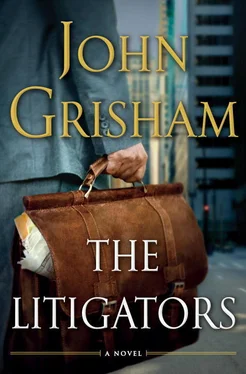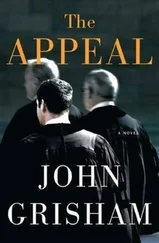Agnes Schmidt was either hiding or not at home. No one came to the door, and the two lawyers hurried away. As he drove, David said, “Look, Wally, I really would like to get home and see my wife. I haven’t seen her much in the past five years. Time to catch up.”
“She’s very cute. I don’t blame you.”
Within a week of filing its lawsuit, the firm had a total of eight death cases, a respectable number and one that would certainly make them rich. Because Wally said it so often, it had become the accepted belief that each case meant roughly half a million dollars in net fees to Finley & Figg. His math was shaky and riddled with assumptions that had little basis in reality, at least at such a preliminary stage of the litigation, but the three lawyers and Rochelle began to think in terms of that kind of money. Krayoxx was making news around the country, none of it positive, and its future looked ominous, as far as Varrick Labs was concerned.
The firm had worked so hard to get the cases, it was a shock to realize they could actually lose one. Millie Marino arrived at the office one morning in a foul mood and demanded to see Mr. Figg. She had hired him to probate her husband’s estate, and then she had reluctantly agreed to pursue a Krayoxx claim for his death. In Wally’s office, behind closed doors, she explained she could not resolve the fact that one lawyer in the firm — Oscar — had prepared a will that kept a sizable asset — the baseball card collection — out of her reach, and now the other lawyer — Wally — was probating that same will. This, in her opinion, was a glaring conflict of interest, and downright sleazy to boot. She was upset and began crying.
Wally tried to explain that lawyers are bound by rules of confidentiality. When Oscar prepared the will, he had to do what Chester wanted, and since Chester wanted his baseball cards hidden until after his death, then given to his son, Lyle, so be it. Ethically, Oscar could not divulge any information to anyone about Chester and his will.
Millie didn’t see it that way. As his wife, she had a right to know about all of his assets, especially something as valuable as his cards. She had already talked to a dealer, and the Shoeless Joe card alone was worth at least $100,000. The entire collection might fetch $150,000.
Wally really didn’t give a damn about the baseball cards, or the estate for that matter. The $5,000 fee he had once contemplated was now peanuts. He had a Krayoxx case on the line here, and he would say or do anything to keep it. “Frankly,” he said gravely as he glanced at his door, “between the two of us, I would have handled it differently, but Mr. Finley comes from the old school.”
“Meaning what?” she asked.
“He’s pretty chauvinistic. The husband is the head of the house, keeper of all assets, the only decision maker, you know the type. If the man wants to hide things from his wife, nothing wrong with that. Me, I’m much more liberated.” He followed this with a nervous laugh that was confusing.
“But it’s too late,” she said. “The will has been written. Now it’s going to probate.”
“True, Millie, but things will work out. Your husband left his baseball cards to his son, but he left you with a beautiful lawsuit.”
“A beautiful what?”
“You know, the Krayoxx thing.”
“Oh, that. Yes, I’m not too happy with that either. I’ve talked to another lawyer, and he says you’re in over your head, says you’ve never handled a case like this.”
Wally gasped for air, then managed to ask, in a squeaky voice, “Why are you talking to other lawyers?”
“Because he called me the other night. I checked him out online. He’s in a big firm with offices all over the country, and all they do is sue drug companies. I’m thinking about hiring him.”
“Don’t do that, Millie. These guys are famous for signing up a thousand cases, then screwing their clients. You’ll never talk to him again, just some young paralegal in the back room. It’s a scam, I swear it is. You can always get me on the phone.”
“I don’t want to talk to you on the phone, or in person either.” She was on her feet, gathering her handbag.
“Please, Millie.”
“I’ll think about it, Figg, but I’m not happy.”
Ten minutes after she left, Iris Klopeck called and asked to borrow $5,000 against her portion of the Krayoxx settlement. Wally sat at his desk with his head in his hands and wondered what might happen next.
Wally’s lawsuit was assigned to the Honorable Harry Seawright, a Reagan appointee who had been on the federal bench for almost thirty years. He was eighty-one, anticipating retirement, and not too excited about a lawsuit that could take a few years to resolve and eat up his calendar in the process. But he was curious. His favorite nephew had been taking Krayoxx for several years, with great success and no side effects at all. Not surprisingly, Judge Seawright had never heard of the law firm of Finley & Figg. He directed his law clerk to check out the firm, and the clerk’s e-mail read: “A 2 man ham and egg operation on Preston, Southwest Side; advertises for quickie divorces, DUIs, the usual criminal, domestic, injury practice; no record of any filings in federal court in the past 10 years; no record of jury trials in state court in past 10 years, no bar association activity; they do occasionally go to court — Figg has either 2 or 3 DUIs in past 12 years; firm was once sued for sexual harassment, settled.”
Seawright was incredulous. He e-mailed his clerk: “These guys have no trial experience, yet they filed a $100 million lawsuit against the third-largest pharmaceutical company in the world?”
The clerk responded: “Correct.”
Judge Seawright: “Insane! What’s behind this?”
The clerk: “Krayoxx stampede. It’s the latest and hottest bad drug in the country; mass tort bar is in frenzy. Finley & Figg probably hopes to ride coattails all the way to a settlement.”
Judge Seawright: “Keep digging.”
Later the clerk responded: “The lawsuit is signed by Finley & Figg, but also a third lawyer — David E. Zinc, former associate at Rogan Rothberg; I called a friend there — said Zinc cracked up, bolted ten days ago, somehow landed out there at FF; no litigation experience; guess he found the right place.”
Judge Seawright: “Let’s watch this case closely.”
The clerk: “As always.”
Varrick Labs was headquartered in a baffling series of glass and steel buildings in a forest near Montville, New Jersey. The complex was the work of a once famous architect who had since repudiated his own design. It was occasionally praised as daring and futuristic, but much more often it was denounced as drab, hideous, bunker-like, Soviet style, and a lot of other unkind words. In several ways it resembled a fortress, surrounded by trees, away from the traffic and crowds, protected. Because Varrick got sued so often, its headquarters seemed fitting. The company was hunkered down out there in the woods, braced for the next assault.
Its CEO was Reuben Massey, a company man who had led Varrick for many years, through turbulent times, and always to impressive profits. Varrick was in a constant state of war with the mass tort bar, and while other pharmaceuticals wilted or folded under waves of litigation, Massey managed to keep his stockholders happy. He knew when to fight, when to settle, how to settle cheap, and how to appeal to the lawyers’ greed while saving his company tons of money. During his term, Varrick had survived (1) a $400 million settlement for a denture cream that caused zinc poisoning; (2) a $450 million settlement for a stool softener that backfired and clogged things up; (3) a $700 million settlement for a blood thinner that cooked a bunch of livers; (4) a $1.2 billion settlement for a migraine remedy that allegedly caused high blood pressure; (5) a $2.2 billion settlement for a high blood pressure pill that allegedly caused migraines; (6) a $2.3 billion settlement for a painkiller that was instantly addictive; and, worst of all, (7) a $3 billion settlement for a diet pill that caused blindness.
Читать дальше












